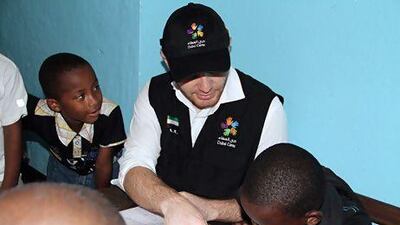DUBAI // Seven years ago, Dubai Cares was given the daunting task of providing education to one million children in the Third World by 2015.
The organisation more than met the challenge and now, after it has funded of dozens of projects in some of the poorest nations, seven million children have access to an education they would not otherwise receive.
"We are in 28 countries with programmes in Africa, Asia, the Middle East as well as in Haiti," said Asma Abdul Malik, the organisation's country programme officer.
"Our key goals are to provide primary education to children and to promote gender equality by encouraging more young girls to get an education."
Launched in 2007 by Sheikh Mohammed bin Rashid, Vice President and Ruler of Dubai, it began with just a handful of staff that has expanded to a full-time team of 30.
Dubai Cares only works with established international charities and non-government organisations.
"We work with organisations that have 10 to 15 years experience in a particular country and have built up relationships with the host government and other groups," Ms Abdul Malik said.
"We also make sure that every dollar spent on a particular project is accounted for and goes where it is supposed to. That's why we visit most programmes on an annual basis to see what it's like on the ground."
Over the years the group has had to shift tactics for its aid projects after initially funding infrastructure schemes for schools.
"What we found was that you can build new schools but that does not necessarily mean children will go to lessons," Ms Abdul Malik said.
"You need a more complete approach by looking at the reasons they are not going and tailor programmes to solve that issue."
It can take between five and nine months for Dubai Cares to begin aid operations in a country after it evaluates needs and works out how best to work with other groups.
It has recently focused on investing in early child development for four to six-year-olds. "By working with children at this age, and their parents, they are much more likely to continue with education as they get older," Ms Abdul Malik said.
Dubai Cares relies heavily on funding from the public and private sector, and UAE residents.
"We are very fortunate to live in a country that has such a sense of giving and that does not just include big corporations, but also the general public," she said.
The group has more than 30,000 people listed on its volunteers database and welcomes new members all the time.
The Dubai Cares: Foreign Aid Disbursements in 2011 report, published by the UAE Office for the Coordination of Foreign Aid, shows the organisation spent Dh84.9 million on projects that year.
There are often two or three aid projects running in a country at a time.
To cover costs, it is crucial that Dubai Cares continues to meet its funding targets.
"We give presentations to both public and private sector organisations to inform them of the work we do and how their funding would help," said Amal Al Redha, a funding specialist who has been with Dubai Cares since its launch.
"In most cases these corporations are happy to help, not just by providing the money but also encouraging their own staff to get involved.
"We are also fortunate that we have many generous high-net-worth individuals who also help, as well as the general public who raise funds for us through various events."
The group will hold awareness campaigns throughout Ramadan.
"The passion for me has always been to make a difference to the lives of people who don't have the advantages we have in this country," added Ms Abdul Malik.
"Although we are proud of what we have achieved over the last seven years there is still a lot more to do.
"There are an estimated 61 million children in the world who do not have even the most basic access to education.
"We still have a lot of work ahead of us but we are up to the task."

